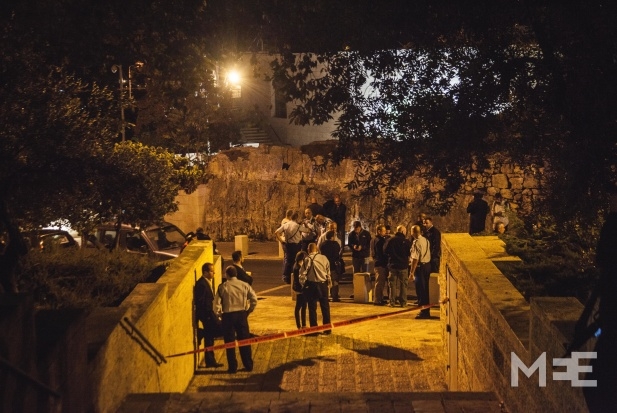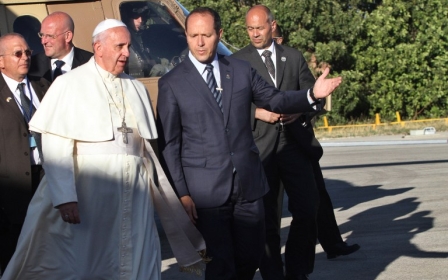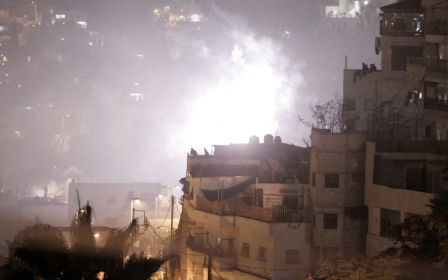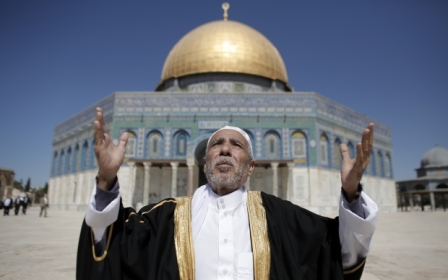Israel police kill Palestinian suspect following shooting of right-winger

Jerusalem police on Thursday killed a Palestinian man suspected of a shooting attack on an Israeli hardliner which left him badly wounded, an Israeli spokesperson said.
"The Palestinian, who was the main suspect in the Wednesday night attack, was eliminated at his home in Jerusalem's Abu Tor neighbourhood by special police forces following an exchange of fire," police spokesman Micky Rosenfeld told the Agence France-Presse (AFP) news agency. The neighbourhood of Abu Tor straddles the seamline between west Jerusalem and Occupied East Jerusalem, which was seized by Israel during the 1967 Six Day War.
Israeli police named the Palestinian man as Mu'taz Hijazi, a former Palestinian prisoner, with alleged links to Islamic Jihad, according to Paris-based news channel France 24.
According to the Palestinian Prisoners' Society, a Ramallah-based non-governmental organisation (NGO), Higazi spent eleven and a half years in Israeli jails, including around 10 years in solitary confinement. He was released in 2012.
Local police sources told Anadolu Agency, Turkey's official news agency, that Hegazi was shot and killed after he opened fire on Israeli forces trying to arrest him. Three other Palestinians were also injured and his brother and father were later arrested.
The suspect's shooting took place just hours after a gunman on a motorcycle opened fire at a right-wing Jewish activist called Yehuda Glick, leaving him critically wounded.
Glick, who is known for his lobbying to secure Jewish prayer rights at the al-Aqsa mosque compound in Jerusalem, had just given a speech entitled “Israel returns to the Temple Mount” at the Menachem Begin Heritage Centre, the official state memorial commerating Israel's former prime minister.
He was reportedly shot four times in his upper body at "close range" outside the event, which was also attended by a number of Israeli members of the Knesset and right-wing activists, Israeli news website Ynet reported.
"The would-be killer turned to [Glick], confirmed in Hebrew with a thick Arab accent that this was indeed Yehuda [Glick], and shot several bullets at him from point blank [range],” Ynet quoted Knesset member Moshe Feiglin as saying.
"What happened is horrible but very expected. Glick was constantly threatened. The fact that he was not assigned protection at all times is a failure. I say this as someone who is the target of constant incitement. Weakness and incompetence were behind this attack. This was a relaxed conference, the room was half full. This was not an impassioned event. An Arab came there with the urge to kill," Feiglin said.
Glick is believed to be in his 50s. His condition improved overnight to serious but stable, the hospital said.
The two shootings come on the back of growing tensions in Jerusalem, which have been enflamed by a growing controversy over the al-Aqsa mosque.
Israeli authorities have shut the compound entirely in response to Glick’s shooting, a move that Palestinian President Mahmud Abbas called "a declaration of war". It will remaining closed until Tuesday morning, the authorities said.
"This dangerous Israeli escalation is a declaration of war on the Palestinian people and its sacred places and on the Arab and Islamic nation," his spokesman Nabil Abu Rudeina quoted him as saying on Thursday.
This is the first time that al-Aqsa has been completely closed since 2000.
"Israeli authorities shut the Al-Aqsa Mosque entirely since dawn," Sheikh Azzam al-Khatib, head of the Jordan-run Organization for Muslim Endowments and al-Aqsa Affairs, told Anadolu Agency.
"We are holding contacts to reopen the mosque to Muslim worshippers," Anadolu quoted him as saying.
Sacred to both Jews and Muslims, the flashpoint al-Aqsa compound houses Islam's third holiest site, but is also revered as the most sacred spot for Jews, who refer to the site as the Temple Mount, due to the fact it once housed two Jewish temples.
Although non-Muslims are allowed to visit the site, Jews are not allowed to pray there. Rumours that Israel was poised to legislate changes to the status quo have triggered weeks of unrest and clashes in and around the plaza.
In September 2000, a visit to the site by controversial Israeli politician Ariel Sharon sparked what later became known as the "Second Intifada" – a popular uprising against the Israeli occupation in which thousands of Palestinians were killed.
“The old city is very tense, 90 percent of the shops are closed," Ofer Zalzberg, Israel-Palestine analyst at the International Crisis Group, a Brussels-based NGO, told the Middle East Eye. "The odd group of tourists wander by in what looks like a ghost city. A few old Arab men who come to pray regularly are standing outside al-Aqsa mosque in front of the police hoping to get in, they sit next to the barrier."
"Most of the merchants didn’t even come. There were lots of warnings in the media not to come to the old city today," he added.
New MEE newsletter: Jerusalem Dispatch
Sign up to get the latest insights and analysis on Israel-Palestine, alongside Turkey Unpacked and other MEE newsletters
Middle East Eye delivers independent and unrivalled coverage and analysis of the Middle East, North Africa and beyond. To learn more about republishing this content and the associated fees, please fill out this form. More about MEE can be found here.




